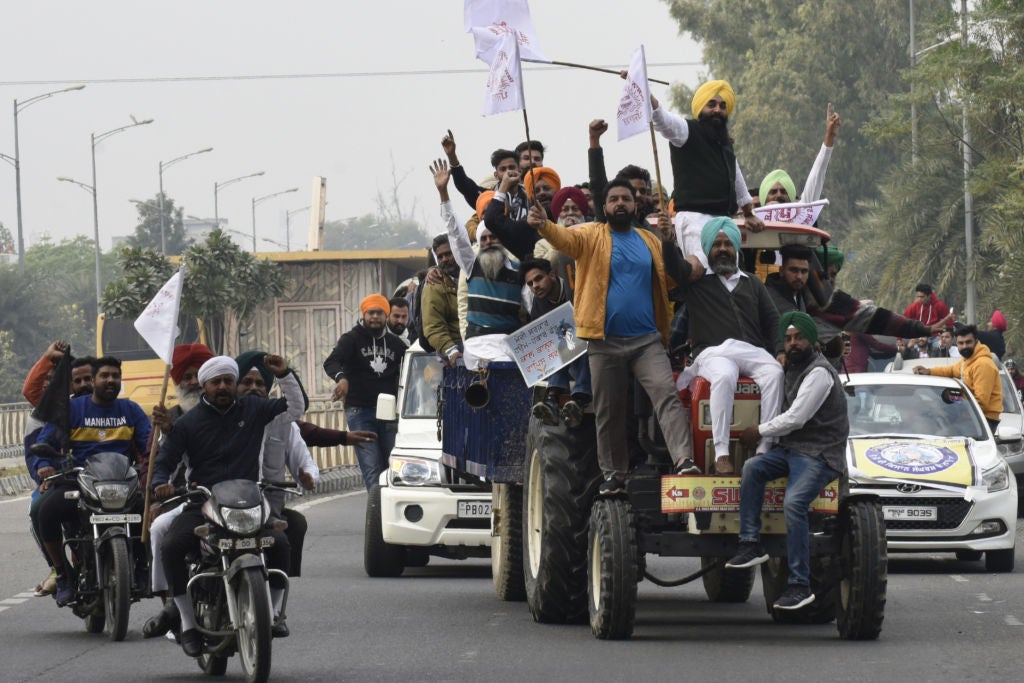Modi’s recent agricultural reforms put the livelihoods and lives of farmers at risk
India’s farmers fear losing their lands, incomes and lives as a result of the government’s new bills


Once again, for the second time this year, New Delhi is facing protests. This time, because of prime minister Narendra Modi’s new laws, which seek to reform agricultural practices and open up the process of buying farmers’ wares to private market forces.
Since 26 November, India’s farmers, mostly from the states of Punjab and Haryana (known as the “food bowl” of India), have been demonstrating on the borders of the capital against two bills that will allow private players a greater role in the sector. The farmers fear this will lead to the complete corporatisation of the Indian agricultural industry.
They believe the measures are a way of reducing the amount they get paid for produce, which until now has been guaranteed by government-backed minimum pricing structures. The reforms have been described as a “death warrant” for a sector where suicides due to financial struggles are already rife. According to the latest National Crime Records Bureau (NCRB) data on accidental deaths and suicides, 10,281 workers involved in the farming sector committed suicide in 2019.
The protesting farmers are worried their prices will be driven down and are terrified the new bills will expose them to exploitation, and permit huge corporations to control their operations.
In the state of Bihar, where the Agricultural Produce Market Committee (APMC) act was annulled more than a decade ago, private players were enabled to straightforwardly procure from farmers. But the outcome has been absolutely the opposite of what was expected. In the state, commission agents who managed the farmers are now replaced by traders who now control the total costs.
Forcing these bills through in the middle of the pandemic and refusing to find some middle ground with the farmers is barbarous.
Firing water cannons and tear gas on peaceful protesters is also unacceptable. India is a democratic country, and peaceful protest is every citizen’s right. Delhi police went so far as to request consent to transform the city's stadiums into temporary prisons to lock down the protestors – fortunately, the authorisation was denied.
"We will lose our lands, we will lose our income if you let big business decide prices and buy crops," Gurnam Singh Charuni, one of farmers leading the protests, told the BBC recently. "We don't trust big business. Free markets work in countries with less corruption and more regulation. It can't work for us here."
Celebrities and foreign leaders, including Canadian prime minister Justin Trudeau and actress Priyanka Chopra, have shown support for the farmers, who also feel the dismantlement of the current system will leave them vulnerable in the event of a dispute with a major enterprise.
Modi’s government has neglected farmers ever since it came to power, bringing about a total loss of trust. It made the hollow promise of doubling farmers’ incomes by 2022. Furthermore, the demonetisation that caused a severe cash crunch in India put strains on rural economies for months.
Regardless of whether some experts believe the recently passed bills will improve India's agricultural sector, how can we believe the government’s actions aren’t just a political move to continue lining the pockets of big corporations that can later provide funding to their party? Does it benefit the local farmers? No.
What would really benefit the farmers is a proper explanation, and a written statement stating that the APMC act won’t be abolished. These new bills may eventually force farmers to sell to private organisations and drive down prices, which could cause many families to starve.
If you have been affected by this article, you can contact the following organisations for support:
mind.org.uk
beateatingdisorders.org.uk
nhs.uk/livewell/mentalhealth
Mentalhealth.org.uk
samaritans.org
Join our commenting forum
Join thought-provoking conversations, follow other Independent readers and see their replies
Comments



Bookmark popover
Removed from bookmarks